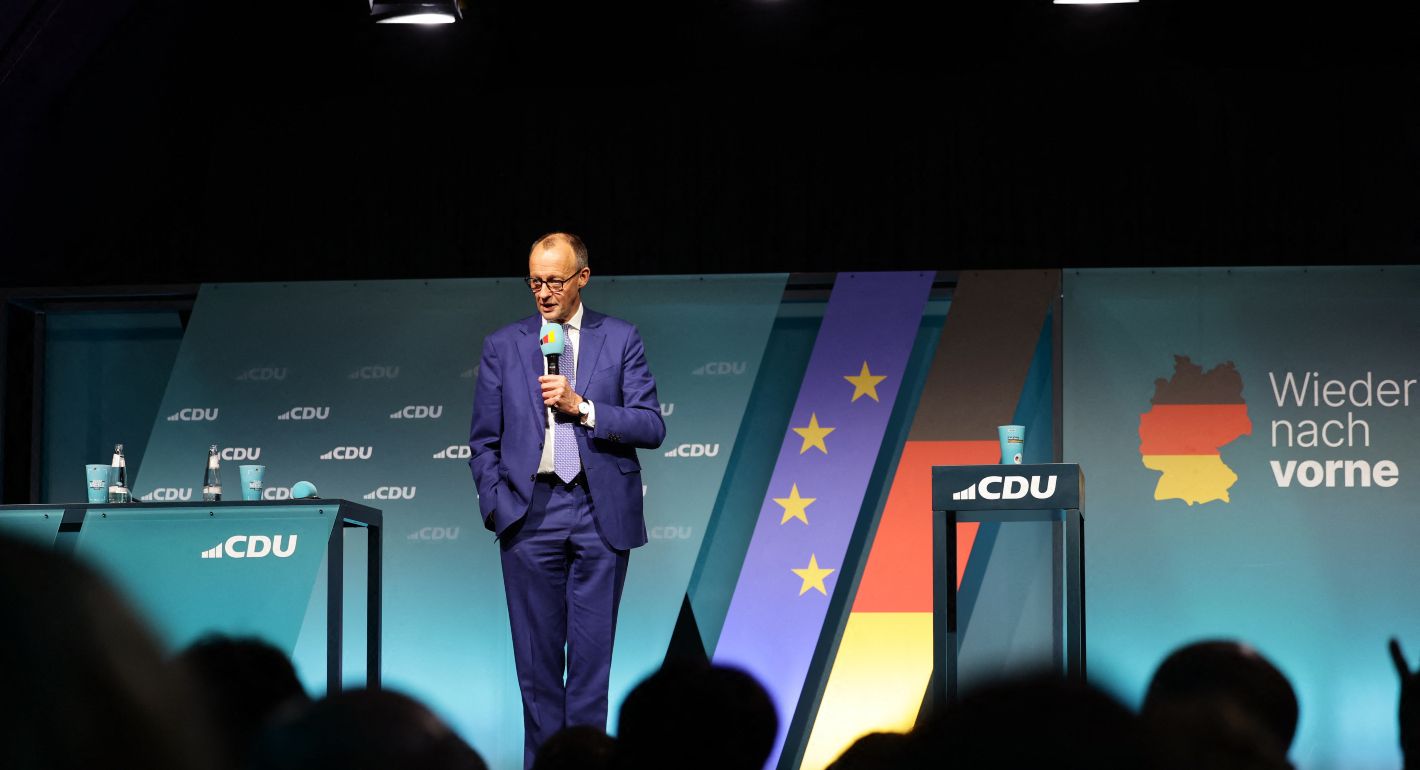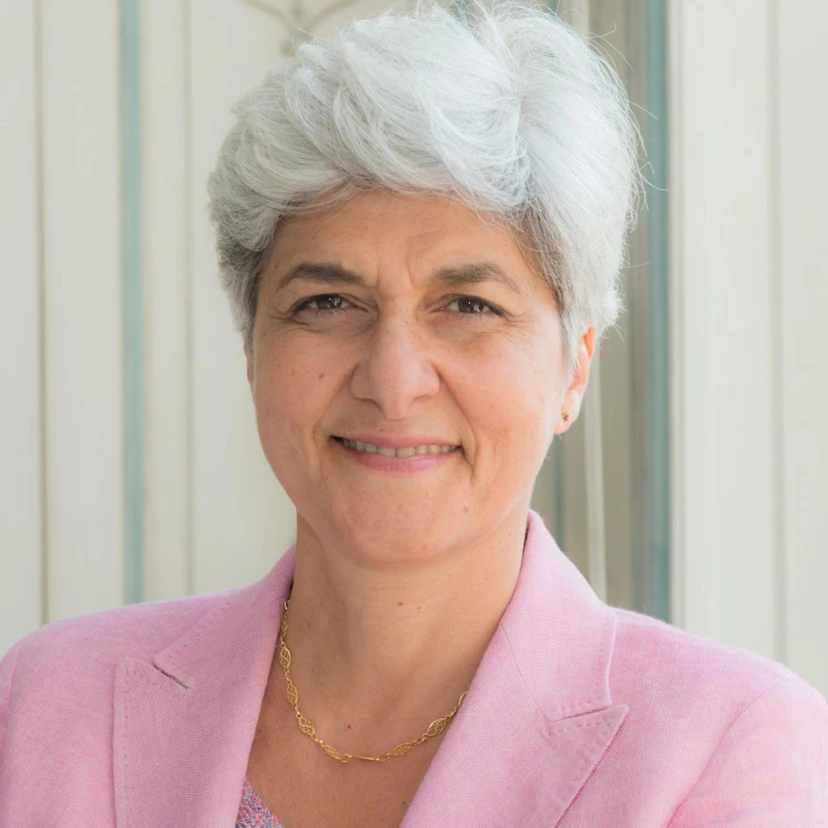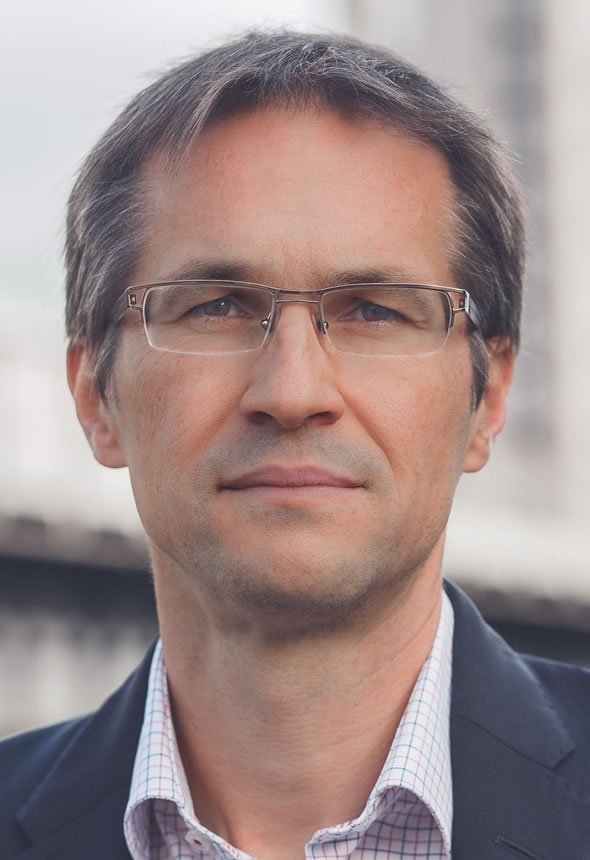Despite offering security benefits to candidates and the EU alike, the enlargement agenda appears stalled. Why is progress not being made, and is it time for Europe to rethink its approach?
Sylvie Goulard, Gerald Knaus

Source: Getty
Germany’s next government has a chance to strengthen Europe’s security and its ability to navigate an unpredictable world order. To do so, it must reverse the country’s economic decline and provide strategic leadership to the EU.
When Germans go to the polls on February 23 to elect a new federal parliament, the importance of the outcome cannot be overestimated. The results will shape the future direction of their country and, especially, of Europe. At a time when U.S. President Donald Trump is dismantling the world’s post-1945 multilateral institutions, a strong and confident Germany—the EU’s largest economy—is needed to give the union some long-overdue leadership.
Throughout this German election campaign, the main contenders have dodged the issues that fundamentally affect the country and the EU. Over the past several years, the leaders of the main political parties have put narrow, national interests above what is needed to make the EU a strong, united, and strategically agile bloc to match the union’s economic strength. Yet, although Europe’s economic growth is linked to Germany’s, the demise of the once-successful German economic model has barely gotten a look-in during the election debates. Nor has Germany’s role in the EU.
It wasn’t always so. Helmut Kohl, the conservative chancellor who oversaw the reunification of Germany, was determined to use that historic event to strengthen the EU. He supported deeper European integration and the introduction of the single European currency, the euro. That meant giving up the deutsche mark to ensure an economically stronger Europe. And he worked relentlessly to bring the former communist East Germany into NATO, despite attempts by Moscow to prevent such a move. For Kohl, a united Germany needed to be firmly anchored in the EU and NATO.
Kohl was arguably the last German leader to push for European integration. His age—he was born in 1930—meant he remembered World War II and the destruction the Nazis wreaked across the continent. For him, wedding eastern Germany into the Euro-Atlantic structures and, at the same time, deepening the EU were essential for European and transatlantic stability.
Successive, younger chancellors gradually moved away from Kohl’s inherent European instincts. They became more inward looking, reacting to instead of internalizing the increasing complexities of globalization, foreign policy, and security issues. While French President Emmanuel Macron has spoken repeatedly about the need for Europe to think and act strategically, Berlin’s reply has been mute. Germany did not use the traditional Franco-German relationship to capitalize on the eurozone by promoting a greater internal market and a different mindset with regard to defense and security. In short, Berlin did not give the EU a clear compass.
That is why the outcome of this German election is so crucial. It is about Germany regaining its role and credibility in the EU.
If Berlin fails to take on this role, the EU, the West, and the global trading system risk becoming a free-for-all. The negative consequences for the security, stability, and predictability that have underpinned the multilateral, rules-based order will be immense and dangerous. A weakening of the post–World War II institutions will encourage authoritarian rulers. It will undermine civil society activists who struggle for democracy and the rule of law. This is a chance for the EU to defend the principles on which it was founded over seventy-five years ago.
Together with the United States and China, the EU has one of the three largest economies in the world. And other EU member states are Germany’s most important trading partners: France, Poland, the Netherlands, Italy, and Austria are the main importers of German goods. In 2023, according to the Kiel Institute for the World Economy, “almost twice as much was exported [by Germany] to these five EU countries as to the USA and China combined.” In other words, the health of the German economy affects the health of the EU, especially the eurozone.
The big question is whether Germany’s next chancellor can rise to the challenges facing the country. The front-runner is Friedrich Merz, leader of the opposition conservative Christian Democratic Union (CDU). According to opinion polls, the CDU, along with its sister party in Bavaria, the Christian Social Union, could win about 30 percent of the vote. But that would not be enough to form a government: Merz, who has eyed the post of chancellor for many years since losing out to his archrival, Angela Merkel, back in 2005, would need one or more coalition partners.
The outgoing coalition of the Social Democrats (SPD), the Greens, and the liberal Free Democrats has not been a great advertisement. It has spent the past four years bickering. The coalition was ideologically incompatible over many issues, including investment, debt, subsidies for noncompetitive industries, energy, and defense spending. The SPD’s Chancellor Olaf Scholz, who in December 2024 lost a confidence vote that triggered this election, did little to give the coalition coherence.
Scholz also played a minimal role in the EU, whether it was on trade, climate change, foreign policy, or further European integration, particularly the single market. The consensus is that whoever takes over from Scholz needs to make bold decisions on how to modernize the German economy and give the EU the compass it requires to face the emerging world order. For this to happen, EU foreign policy needs to be accompanied by a strong economy to give it credibility.
In concrete terms, this means completing the European single market. In a trenchant analysis of what the EU should do, former European Central Bank president Mario Draghi last year called for major structural and political changes that would make the union competitive. The Center for Strategic and International Studies summed up Draghi’s report as “strategic and ambitious” with its focus on three key challenges for the EU: “closing the innovation gap with the United States, harmonizing decarbonization with competitiveness, and enhancing economic security by reducing dependencies.”
Scholz’s coalition campaigned for none of these issues, at the expense of preparing Europe for the enormous technological and political changes that are affecting the global economy. Whether these crucial issues can be addressed depends on the composition of the next coalition. Germany’s 59.2 million registered voters have to decide what kind of government they want—and need—to deal with the plethora of domestic problems and foreign policy crises.
The latter have had little resonance in an election campaign largely dominated by migration. Politicians have skirted over the illnesses that are ailing the German economy and, by implication, Europe. Many reports argue that Germany’s post-1945 economic model has run its course. Over the decades, Germany assumed that it could sustain this model by relying on cheap gas from Russia, an insatiable global appetite—particularly from China—for its car and chemicals exports, and the EU market for sales, especially of its manufacturing goods. Complacency and predictability postponed innovation and diversification. That era is coming to an end. As the German Council of Economic Experts has stated, the German economy has lost most of its competitiveness internationally, and Germany is at risk of losing ground in terms of innovation in major modern technologies.
These are controversial and difficult issues to raise with voters because the solutions require job cuts, retraining, and a shift in mindset away from traditional manufacturing sectors toward AI and services. Politicians, understandably, do not want to scare away voters. Both groups are often risk averse or look at the short term despite Germany’s increasing noncompetitiveness, growing unemployment, demographic crisis, and inability to innovate and modernize.
Merz, a lawyer and businessman, did raise these issues during Scholz’s confidence vote in December. He made a fiery speech that pulled no punches about the parlous state of the economy. Since then, Merz has been cautious about spelling out what changes are needed. But a reality check might give the younger generation some hope for real change about their country’s outdated models.
Those models, as Merz himself said, stifle innovation. Initiative is stonewalled by bureaucracy. Heavy taxes on incomes go toward financing the ever-increasing elderly population and subsidizing noncompetitive industries. And when subsides are allocated to new non-German technology companies, these firms leave Germany; even German companies are leaving. At the same time, infrastructure suffers from underinvestment. Germany’s investment gap is estimated to be €600 billion ($623 billion), the equivalent of 15 percent of the country’s GDP. That excludes the additional €30 billion ($31 billion) needed each year to bring Germany’s defense spending up to the NATO commitment of 2 percent of GDP.
If Merz does become chancellor, he may end or at least modify Germany’s debt brake. This brake, which restricts structured annual budget deficits to 0.35 percent of GDP, was introduced in 2010 to rein in surging government debt. But it has since hindered critical investment in strategic capabilities, such as infrastructure, education, and technology, including AI. Meanwhile, the infrastructure needed to encourage research, fund universities, and promote venture capital has been off the outgoing coalition’s radar screen.
Merz has not shied away from these issues. Yet, he knows that fixing the German economy will depend on his coalition partners.
Merz has ruled out a coalition with the far-right Alternative for Germany (AfD). He needed to say that—and do so emphatically—after he relied on the AfD’s support on January 29 to pass a nonbinding parliamentary motion to restrict migration. The motion proposed permanent controls on Germany’s borders and the rejection of immigrants who lack papers, including asylum seekers. The Greens and the SPD said that in passing the motion, Merz was violating EU and German law. What none of the parties dared state in public is that the country’s immigration procedures are too bureaucratic, the courts are too slow in making judgments, and the asylum system is dysfunctional.
Merz hit a raw nerve. By relying on the AfD to push through his motion, he raised the specter of the past. The AfD has Nazi sympathizers among its members. It is anti-Islam. But more fundamentally, it has a program that is nationalist and patriotic in ways that hark back to the 1930s. During this election campaign, the parties have not articulated their positions on the past—the Holocaust and the devastating impact of World War II on Germany’s and Europe’s political, cultural, economic, and social outlooks.
Merz’s dependence on the AfD led to huge demonstrations in big cities. But the taboo was broken: Instead of explaining why Germany needed a more coherent migration and asylum policy, Merz crossed a redline. The AfD was buoyant. It is now polling at about 20 percent, making it the second-most-popular party, way ahead of the SPD’s 15 percent.
As the election draws nearer, Merz is facing the prospect of a CDU-led coalition with the SPD—dubbed a grand coalition. That would comfort Scholz’s left-wing supporters and even mobilize them. They want Germany to spend more on social welfare and postpone deindustrialization. They want subsidies for the country’s failing car industry and more generous pensions for the elderly. The youth and education hardly get a mention. Such a coalition would jeopardize Merz’s ambitions to modernize the German economy. Too many compromises would have to be reached.
Depending on how the Greens do—they are also polling at around 15 percent—they may be a potential coalition partner. Their role in Scholz’s outgoing coalition has been far from stellar. Robert Habeck, the party’s leader, mismanaged the government’s energy policy by making the transition to renewables bureaucratic, complicated, and costly. But when it came to Russia’s aggression against Ukraine, the Greens consistently supported sending more sophisticated weapons to Kyiv and recognized Russia’s imperialist security aims. And Habeck is a quintessential EU integrationist.
As for Scholz, he consistently opposed moves to give the Ukrainians the weapons they require. He did not fulfill a speech he made after Russia’s February 2022 invasion of Ukraine in which he pledged to fundamentally change Germany’s defense and foreign policy stance. For his part, Merz is keeping his options open.
But what do these coalition possibilities mean for the German economy and for Europe?
If the polls are confirmed, Merz will have to choose between the SPD and the Greens. Yet, the grand coalitions that formed the government in Merkel’s first, third, and fourth terms produced few reforms. A new report by the American-German Institute spells out how successive German governments, dating back to 2005, refused to tackle the underlying problems of the economy. “A major issue is that Germany’s economy still relies on industries and technologies developed 150 . . . or 100 years ago . . . in which the country was a global leader until about a decade ago,” states the report. It continues, “Germany has not successfully fostered transformative companies or innovated existing industries [and] has completely missed the opportunity to digitize and modernize its public administration.”
It is difficult to see a CDU-SPD coalition working together to modernize the German economy or offer the leadership that is urgently required. Indeed, even when Merkel was chancellor, the future direction of the EU did not top her agenda. No matter how often Macron spoke about the need for a stronger, more integrated Europe—and for strategic autonomy, which is now more important than ever given Trump’s attitude toward Europe and NATO—Merkel never responded in a way that showed how she considered the bloc’s future. Scholz has rarely spoken about the idea of Europe or the strategic challenges facing it. Diplomats at EU summits complained about Scholz’s lack of engagement. What mattered was what happened back in Berlin.
This context is important for understanding how Germany’s incoming government needs to reverse years of benign neglect toward the EU, not only by Merkel and Scholz, but also when the SPD’s Gerhard Schröder was in a coalition with the Greens from 1998 to 2005. Kohl’s legacy is all but forgotten. He sensed the vulnerability of Germany and Europe: If these two players did not work together to give the EU the unity it needed, Europe would not mature into a political and economic bloc that could exert influence and power.
Kohl’s legacy has little traction in today’s CDU, or indeed among the German political class. Yet, Merz’s advisers know that reforms to the German economy, which will take time to have an impact, will make a difference to Europe. An economically strong Germany will give the next chancellor the opportunity to push European integration. And given what is happening in the United States, the EU urgently needs to complete the single market. As the Kiel Institute’s report states, “only a strong EU single market can create a level playing field with the USA and China. On its own, Germany is too small economically (and politically) to negotiate on an equal footing with its partners in the USA or China.”
The choices for German voters on February 23 could not be clearer. An economically stronger Germany means more Europe. Even a more political Europe, which is needed more than ever before.
Carnegie does not take institutional positions on public policy issues; the views represented herein are those of the author(s) and do not necessarily reflect the views of Carnegie, its staff, or its trustees.
Despite offering security benefits to candidates and the EU alike, the enlargement agenda appears stalled. Why is progress not being made, and is it time for Europe to rethink its approach?


Sylvie Goulard, Gerald Knaus
With the blocking of Starlink terminals and restriction of access to Telegram, Russian troops in Ukraine have suffered a double technological blow. But neither service is irreplaceable.

Maria Kolomychenko
Over the past two decades, regional collaboration in the South Caucasus has intensified. Turkey and the EU should establish a cooperation framework to accelerate economic development and diversification.



Feride İnan, Güven Sak, Berat Yücel
A new Carnegie survey of Indian Americans examines shifting vote preferences, growing political ambivalence, and rising concerns about discrimination amid U.S. policy changes and geopolitical uncertainty.



Milan Vaishnav, Sumitra Badrinathan, Devesh Kapur, …
Integrating AI into the workplace will increase job insecurity, fundamentally reshaping labor markets. To anticipate and manage this transition, the EU must build public trust, provide training infrastructures, and establish social protections.

Amanda Coakley